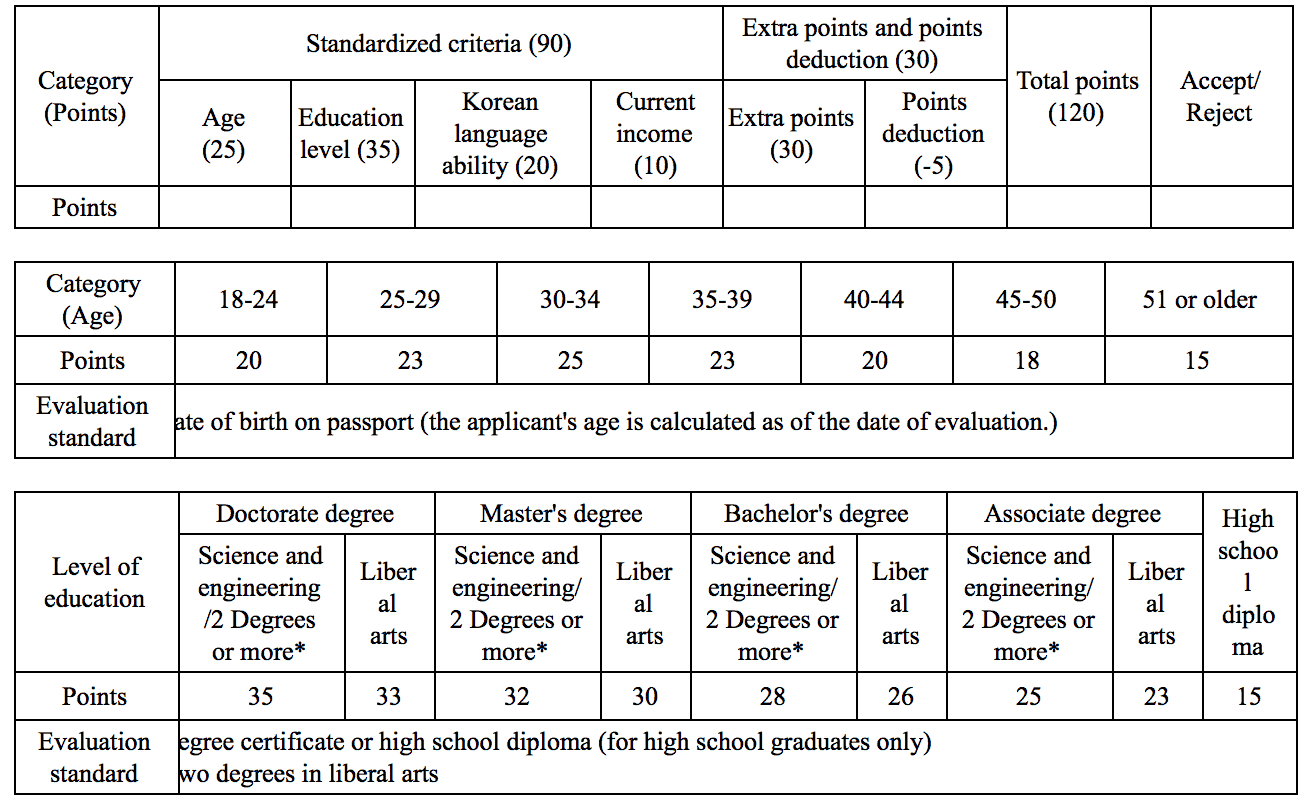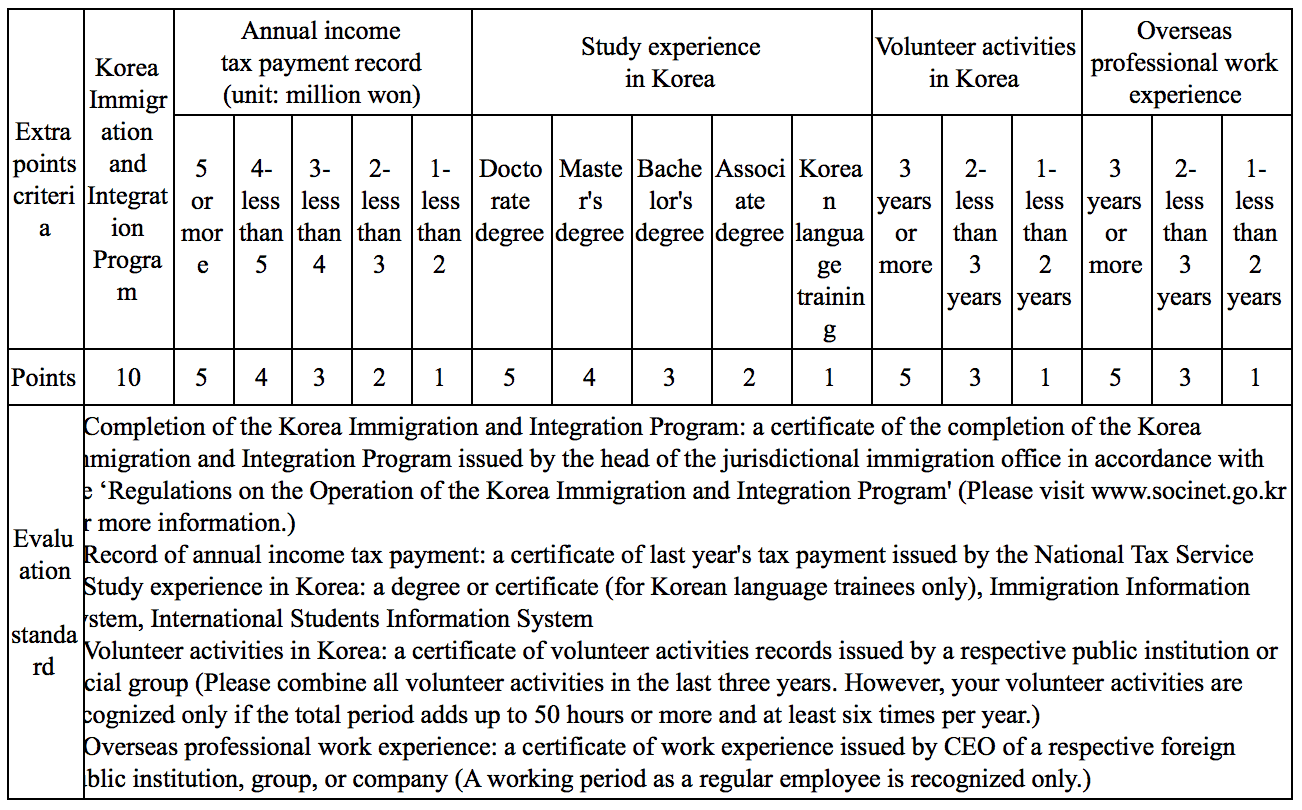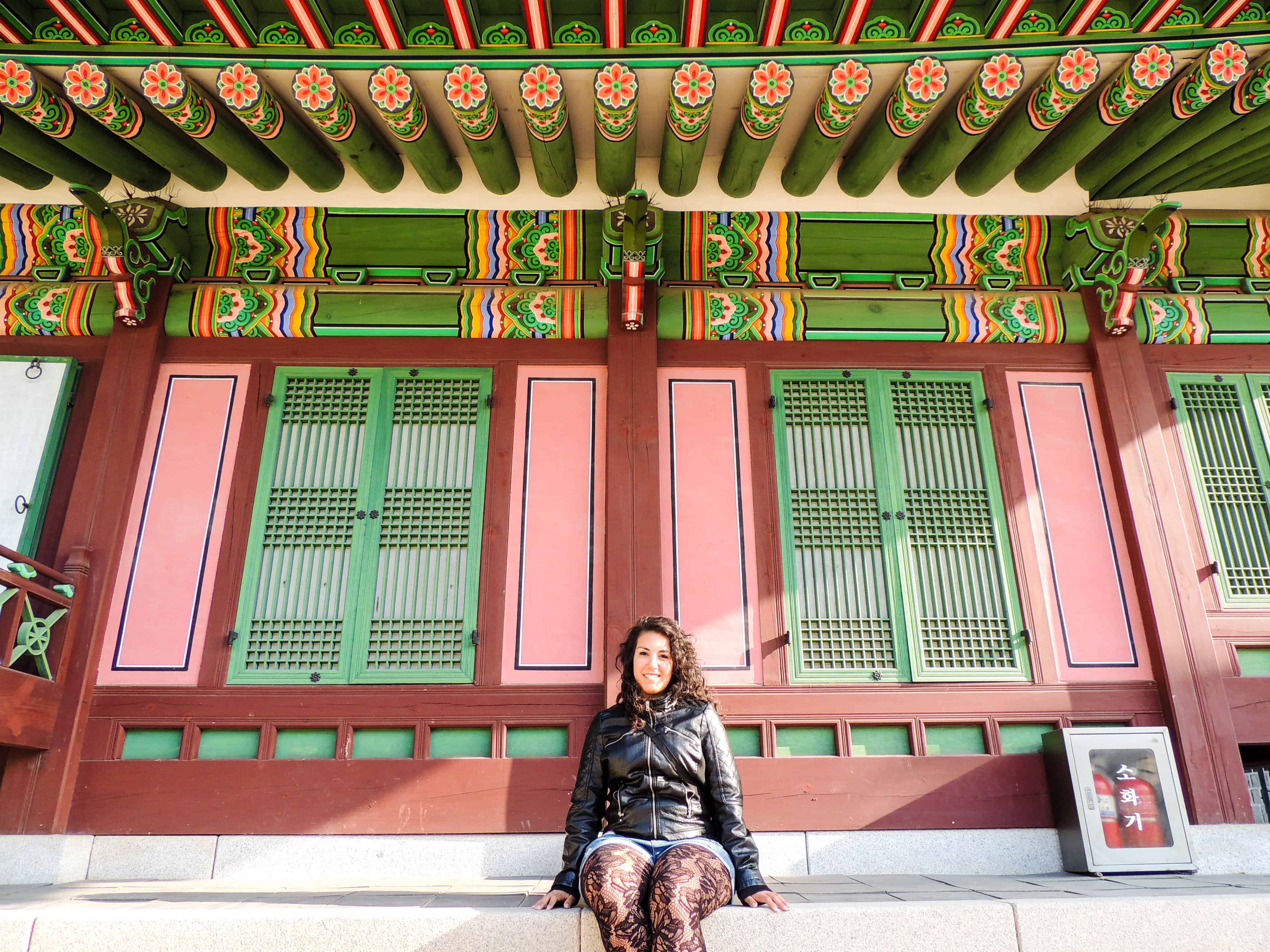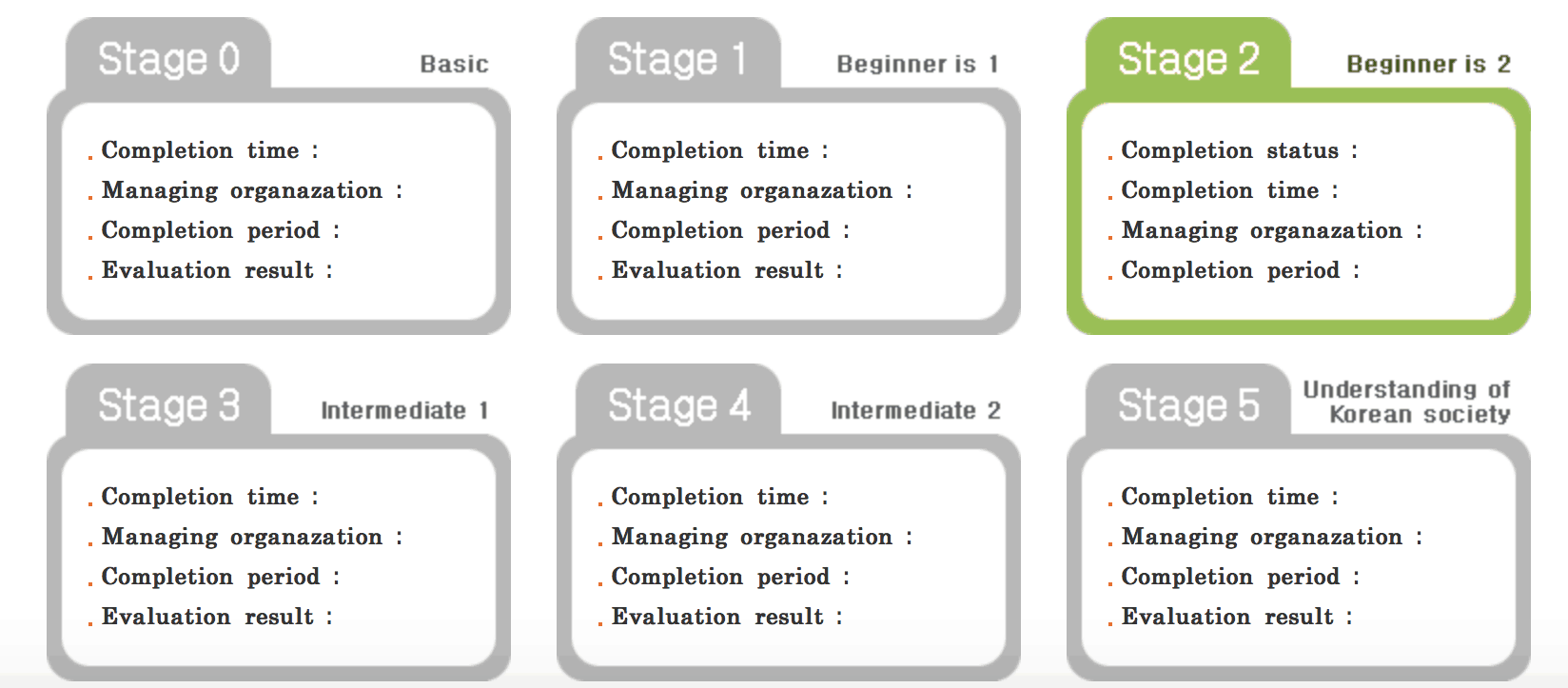I can’t tell you how good it feels to FINALLY be able to let the cat out of my pants. Or is it the bag? Tienes un gato en los pantalones? Whatever. Feel free to laugh at my incredibly bad dad jokes. Today, I wanted to discuss my experience with the KIIP or the Korean Immigration and Integration Program.
This is a program aimed to help people who are wanting to put down roots in Korea. There are 6 levels total (0-5). The first five are aimed at learning Korean and grammar while the last level is geared at understanding Korean society. Level 0 is 15 hours and level 1-2 are 100 hours each. They take about 2-3 months to complete. Many people complete up to level 5 to get the extra points toward the resident visa which is something I’m working toward. This F-2 visa will give me the freedom to work online as I wish and live in Korea and not teach English.
The F-2 visa is based on a point system for age, money you make, TOPIK scores, and volunteer activities. Below is an updated chart (as of 2015) about what the government is looking for in regards to the point system.
Blog Posts You Might Like
- 75 Things No One Tells You About Korea
- How To Get a Job Teaching English in South Korea
- How To Study Korean | Helpful Korean Books & Apps
- How To Learn Korean Quickly With 90 Day Korean
- I Experienced Racism in Korea
My Situation
Why did I choose to get the residency visa? I am passionate about liking Korea and wanting to stay in Seoul as my home base. I like Korea, the food, the culture and the people for the most part. I have health care here (which is something I don’t have in America). And, I am debt free. I finally paid off my student loans with all the pensions and bonuses I’ve made in Japan and Korea! Woohoo! I don’t need a car or a house. At this point in my life, I don’t see the need for either. Also, part of my decision to stay is I like my exciting life abroad. Life in America will always be there.
The next reason is also a bit hard to admit because it’s something I’ve only spoken about with family and close friends. I usually don’t get so personal and talk about my problems, but my younger sisters don’t talk to me. One of them started talking to me sparingly and the other doesn’t talk to anyone. I’ve thought about returning to try and patch up the relationship between us, but it’s really hard to reach out to young 20-somethings who are trying to figure out their own shit. It’s whatever, I’ve tried reaching out, and I can only be there once they decide (if they decide) to reach back out to me. I really miss my mom, my brother, and my dad. Other than that, a lot of my friends have moved on with their lives. They’re getting married, having kids, getting houses. While I am super happy they are getting what they want, I don’t want that particular lifestyle. I’m perfectly happy eating kimchi, traveling, dating all the papacitos I want, and pumping iron at Cross Fit. The world is my oyster and I want to traverse the globe while my legs are still strong.
In addition, I don’t have to worry about getting shot because my country has crazy people that insist on being stupid and not enforcing gun regulation. Of course, Korea has their own set of problems like sexual harassment, yellow dust, and a huge pay gap between men and women, but that’s something I’ll get into another day. No country is perfect, but for right now, Korea is the right fit for me.
I wouldn’t have applied for the resident visa had I not qualified for the 5 extra points for professional experience abroad. Luckily, I was on the JET Program and working for the Japanese government (aka the Kencho) in Okinawa. All I need to do is get a letter stating I worked there from 2012-2015 and I’m set to go. By the time I complete the KIIP course with all my other qualifications, I will have 84 out of the 80 points I need to get that visa.
Why do I want to stay in Korea? Simple. There’s a lot of opportunity for me here as a blogger. I have had countless opportunities to work with the Korean and Japanese tourism boards. I love Asia. I always have ever since I was young.


How I Prepared
As a blogger, the first thing I did was go searching for other bloggers who have taken the KIIP. How better than to asses the test than to find someone else who has taken it and written about their experiences doing so? I read a blog from another woman who had been in Seoul five years and married to a Korean man. After reading her blog, it seemed like she actually enjoyed taking the test and that it was a pleasant experience. I actually felt hopeful after reading her blog post and that the test wasn’t as bad as I thought it was.
WRONG.
I really wanted to know what to expect on this test and how to do well. I didn’t want to be blind sided about what was going on, so I wanted to make sure I understood the test format. To study, I bought the level 2 book, went through level tests 1-2, did the KIIP placement test, and even bought the KIIP Practice book.
I went through my materials diligently, self-studied, and even hired a tutor. Also, personally, I don’t think the KIIP Practice reviewer I used was all that helpful when it came to the test. It helped me acquire more vocabulary and simple grammar structures, but that’s about it. I wouldn’t recommend buying it, and you should just stick to grammar books.
Practice Tests
Below are the practice tests you can take for each level. They will help you study and know the style and what to expect when taking the written exam.
Guide to 2018 Korea Immigration & Integration Program (KIIP)
Helpful Resources
Below you will find a list of resources from blogs, YouTube channels and Facebook groups. Each of these will help you self study while on the program or if you get a terrible teacher.
Ganada Korean For Foreigners Elementary
Ganada Korean For Foreigners Advanced
KIIP Korean Program Unofficial Support Group (Facebook)
Korean Grammar in Use (Beginner)
Korean Grammar in Use (Intermediate)
Korean Grammar in Use (Advanced)
Say Hi Korean (Translated KIIP Books)
Talk To Me in Korean Workbooks

Placement Test
On the day of the test, you are to bring your Alien Registration Card, your test ticket, and writing utensils. I also brought some snacks and water because I knew it was gonna be a long day. I took my test at Soongsil University. At the university there were people in KIIP sashes directing examinees where to go. On the outside of one of the buildings were giant posters with a list of names directing people which floors to go to.
The test ticket stated we were told to be there 30 minutes before the test which would start promptly at 12:30pm. The wording was really weird and it made me think I was late coming from my house in Gyeonggi. I took a taxi and arrived at 12:10pm, only to figure out the test started at 1pm.
After going into my classroom, the desks were arranged by our registration numbers which were arranged according to our birthdays. You are not allowed to have you personal items such as bags or cellphones at your desk. They are to be put in front of the classroom along with your cellphones which must be shut off. (Totally random, but the classroom looked like a prison. There were small windows and the door was solid metal with no window… Scary…)
My classroom was supposed to be about 52 people taking the test. Guess how many didn’t show up? Twenty-eight. A little over alf the people who signed up didn’t even bother coming. A note to all of you planning on blowing off the test–don’t do it. It will affect your chances of testing in the future.
You are given instructions about how to fill out your score card. If you don’t understand, then look around you or just ask. You’re also given a special marker to mark your score card and you’re allowed your utensils to write on the test booklet.
The Writing Test
Remember how I told you the book and the practice tests weren’t very useful? Well, the test was A LOT harder than I expected. Since more and more people are trying to put down roots in Korea, I guess they’re trying to make it harder and longer for people to do so. Personally, I think these classes are bs because the naturalization test for my country is 20 questions and with a little studying an idiot could pass it. For instance one of the questions currently is, “Who is the president of the United States?” Unless you’re living under a rock, you would know there is a very orange Oompa Loompa named Donald Trump sitting in the oval office.
They give you exactly one hour to take it and the test begins with a whistle blowing promptly at 1pm and at 2pm. After, you are required to hand in your materials such as the provided marker, your test booklet and answer card.

The Speaking Test
This was the portion I was most nervous about. As I had prepared by speaking and practicing with my Korean friends, I didn’t feel 100% confident, but I felt better because I thought I knew what to expect and how to handle the situation.
Going into test day, I was so RIGHT.
There were two judges in my group. One older woman and another younger woman. There were five seats and taped to the seat desk was a passage we had to read about a friend visiting another friend’s hometown and how they got there. The guy next to me was asked to read two sentences of the passage before the judges became annoyed with his slow reading speed, said, “NEXT” and asked me to finish it. After I finished, I saw that they marked me with a one. (The scale is from 0-5.) I was really frazzled after that because I know I didn’t deserve such a low score. I had practiced reading every day for a month. Then, they asked two questions related to the first two lines which I answered fine. With the third question, I was asked to describe my hometown.
I was so darn excited because this was something I knew I would be able to do. Chicago pizza, Da Bulls, and Michael Jordan? Heck yeah, girl. I’ll tell you all about it. I was a little nervous so I took a deep breath and let the words come out. When I was speaking, I said, “제 고향은 시카고 이에요. [My hometown is Chicago].” I should have said, “제 고향은 시카고입니다.” I realized my mistake too late and continued to try to talk about something else. I didn’t even get a chance because I was very rudely cut off with a, “NEXT!”
As a language teacher, I would never EVER cut someone off while they were speaking. Or even in general, I would never do that. How rude do you have to be to stop someone when they are talking? Seriously. Maybe I’m one of those rare unicorns that grew up with more patience and empathy because my mother’s native tongue isn’t English.
Anyway, that’s when I learned about the cultural differences in American test taking versus Korean test taking. In Korea, they have their bballi bballi “빨리빨리” culture. This phrase means to do everything quickly. So if you don’t answer the question quickly and perfectly, there is only one answer to your hesitance. “Fuck you.”
How anyone’s vocabulary can even be evaluated after one sentence is honestly news to me. But apparently according to the test proctor evaluating me for the speaking test, I’m dumb af.
What I really think…
BIYOTCH. Why you no wanna know about Chicago pizza? Next time, Imma slam dunk your face Michael Jordan style into diabeetus on a plate. You’ll be seeing the Bulls instead of stars and singing Space Jam when I’m done with you!
Can you tell I’m still incredibly salty?
Now, I’m not saying this to scare you. I’m telling you about my experience and that I honestly think I was graded unfairly by not even given the chance to finish what I was going to say. Perhaps other people had nicer test proctors on April 21, 2018 who actually let them finish when they were speaking. They might have gotten the luck of the draw whereas I did not. However, I have talked to a lot of people and the general consensus is the same. If you’re not fluent then they don’t even bother, and mark you as low as possible.
Everyone says that they need to evaluate quickly because there are so many people. At my location, this wasn’t the case. There were three different groups and a total of 15 test takers in the classroom. There were three classrooms on the floor I was on. Two for the written test and one for the speaking test. And so many people didn’t show up to even take the test. They definitely could have spared a few more seconds to let me finish. Do the math. They are [insert expletive of your choice here].

The Results
Unfortunately, I scored a lot lower than I wanted. With 31 points, I was a pretty solid level 2 (10 points away from level 3 where I wanted to be). I also had a feeling I would score level 2 based on my test scores from the practice tests. Considering I only studied diligently for a month, I’m pretty proud of myself for coming as far as I did. And in case ya’ll wanna troll on me, let me tell you something. I learned Japanese by speaking and doing. I only studied the writing system from a book and I learned by talking to people. The same rings true for Korean. I am a product of my surroundings and an excellent listener, might I add. 😉
How to Sign Up For Classes (Korean Only)
Level 0: Basic
- Required attendance: 15 hours
- Score below 3 on the oral test
- If you write level 0 on the application, you don’t need to take the level test.
Level 1: Basic 1
- Required attendance: 100 hours
- Level test score: 3-20 points
Level 2: Basic 2
- Required attendance: 100 hours
- Level test score: 21-40 points
Level 3: Intermediate 1
- Required attendance: 100 hours
- Level test score: 41-60 points
Level 4: Intermediate 2
- Required attendance: 100 hours
- Level test score: 61-80 points
Level 5: Understanding of Korean Society
- Required attendance: 50 hours (+ 20 hrs 심화)
- Level test score: 81-100 points
Personally, taking the KIIP placement test ranks up with one of my lesser favorite experiences in Korea. It was really stressful studying for the test and a lot of the grammar points I studied in the reviewer weren’t even on the test. I think the speaking portion needs to change and they need to be less rude. I’m honestly still shook and angry about being cut off when I was trying to talk. I’m not fluent but I can make sentences and I can talk about things, albeit not perfectly. Again, this probably has to do with the Korean mindset of if you’re not perfect, you’re not good enough and even if you are, you’re still not good enough.
Learn from my mistake kids, and be prepared for very rude test proctors or be pleasantly surprised when they act like decent human beings. It’s the luck of the draw but if you can’t answer immediately, they will most likely ignore you.
Granted this was a placement test, but when it comes to my speaking ability, I honestly believe I wasn’t evaluated fairly and I really think that this awful practice of being rude af should change.
Level Two
I had two very unique and different experiences with Level 2. The first time I took the class, I attended Hankkuk University of Foreign Studies. I had a female teacher and let me tell you something… She was AWESOME.
She only taught Korean in Korean and she spoke slowly enough for us to understand what she was saying. I knew it was possible to learn a language in the target language, but it was such a humbling and great experience being on the opposite side. She gave plenty of examples and helped up learn the vocabulary by using it many times in class.
My teacher also gave side projects to help our speaking like giving us topics and having us present them to the class. I really liked that as she also corrected our scripts and made sure we were as prepared as possible. She gave us a lot of opportunities to speak and lots of little sentence problems to solve. My brain was constantly working in that class and I loved it.
When it came time for the test, I did my best, but I only failed by one test question. I was absolutely devastated because I did my best to study as much as possible and I still didn’t pass. I cried for days after because I felt like such a failure. Luckily, at the time, my brother and mom were visiting in Korea so they made me feel better, but it still sucked nonetheless.
Repeating Level Two
For me, the commute to and from Hankkuk University was a three hour round trip. Top it off with class for three and a half hours, three times a week and I was dying.
I chose to go to a center nearer to my house (only an hour away) and thought I would make the best out of a shitty situation. I wish I could say the second time really helped me learn the materials and reinforce what I learned, but it did not. I had a pretty terrible teacher and I ended up ignoring him and bringing my laptop to class to work on my blog and YouTube channel while he channeled his own theatrics.
The rules of KIIP go as follows:
If you fail the class the first time, you have the option to retake it, as long as you reach the required attendance of 80 hours. Then you can retake the exam and automatically pass to the next level even if you have 60 points or not.

Level Three
Unfortunately, when I went to level 3, I didn’t realize I would have the same teacher as level 2 and he is honestly the WORST teacher I’ve ever had in my life. He would talk at us, never prepared power-points, never taught the grammar, and expected us to absorb his “all knowing knowledge.” Sorry, but where I went to school, teachers were not taught to teach this way. The student doesn’t have to adapt to you. You have to adapt to the students.
He also made fun of some of my classmates’ pronunciations and also spoke other languages besides Korean. He was very narcissistic because he claimed to know so many languages. At times, he would speak to me in broken Spanish and I had no idea what he was saying. I never felt comfortable speaking with him in class because he pretended he couldn’t understand me. He knew I often never paid attention to him and would study quietly at my desk. He knew this and he would call on me to give an answer when he KNEW I had no idea where we were. This is definitely one of the biggest bullying tactics he used against me.
My last straw with the teacher was when he told my test score to one of my classmates and I didn’t even know it. If this EVER happens to you, I urge you to call your nearest immigration office that deals with KIIP. They should not be sharing the scores before they’re officially posted online.
The fact my score isn’t anyone’s business but my own and the fact my classmate knew before I did is unbelievable and just a slap in the face. It’s devastating enough I didn’t pass let alone someone else knew my score and my classmates knew I failed. Good on my classmate for telling me what had happened. However, since my score is officially out in the open, I failed level by one test question yet again.
With level three, I had to do a lot of self study because I wasn’t learning anything in class. Luckily for you readers is how I added so many external resources to the help section. I sincerely hope this will help you get through your levels with more ease than I had. I would also like to caution there is a HUGE jump from level two to level three in regards of difficulty. Before you start the class, start going over the grammar and vocabulary.
In Conclusion
Honestly, at the end of all this, I can say I did my best. I really tried to learn to the best of my abilities, but I didn’t pass and successfully wasted 160 hours sitting in class plus however many I wasted trying to self study just to figure out what’s going on.
I can also say not all teachers on this program are created equal. You are going to get really old teachers who only know the Korean style of teaching and talk at you, or you’re going to get awesome teachers like the one I had at Hankkuk University. With more and more people going through the program, there’s only going to be an influx of teachers who have no business being in the classroom.
So what are the pros of KIIP? Well, it’s a free class and the textbook is cheap. It forces you to study when you probably wouldn’t.
The cons? You’re playing Russian Roulette when it comes to getting a good or bad teacher. For me, the stress, energy, commute, and lost sleep do not make these classes worth it. I didn’t learn much speaking and feel like my abilities haven’t improved since level 2.
Whether you’re looking to get the F2 visa or just learn Korean, take my experience for what you will. You know I will always be completely transparent with you and never sugar coat what goes on. As always, stay beautiful and I hope this blog post will help you in your endeavors.


Free Seoul E-Book
Do you love South Korea?
Enter your name and email address and click the button below to receive your Easy Seoul Travel Guide so you can travel like a local!















Thank you so much for this! It’s so informative to some of us who might want to work towards Korean residency in the near future. Don’t be discouraged! Take the test again. The right doors will eventually open for you ❤️
Hi Gina! I have questions about the KIIP. I’m pretty sure I am at the basic level 0 right now, though I can read Hangul. I am supposed to go in for a test tomorrow but my friend called the immigration office asking if she could skip for the same reason. They said you can’t cancel the test, but you can skip and apply for the basic level when classes show up on screen.
My questions are:
a) Is this true? and
b) When do classes open up? Because I’d like to be informed ahead of time in case they fill up.
My third question is I see that the Basic level is only 15 hours. After that, do you go straight to level 1 or do you need to wait until classes open again to apply?
Thank you for all your information.
Hi Debbi. What the immigration officer said is true. You can’t skip the test otherwise you will be banned from taking it for one year. Just go in, take it, and do your best. Level 0 is 15 hours because it’s all about learning Hangul. After completing level 0, you need to wait until level 1 classes open to apply. Best of luck and I know you’ll do great!
Hi. I just want to ask’ i was about to get the evaluation exam yesterday but i didn’t make it because of personal matters can i still get a retest??
I’m not sure. I think you might have to wait another year to take it. But I’d call immigration just to double check.
How to know if you pass the level test? I am currently in Level 2 online class and already finished the test today. It was already posted the test result and i got a lowest score 60% down but my attendance is 80% up is quite good. And when should i apply for another semester?